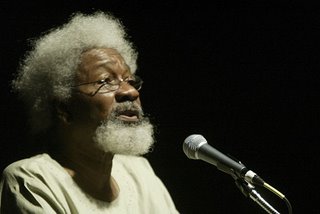Wole Soyinka

Wole Soyinka is a Nigerian writer, charismatic, slim, with curly white hair. He was a Nobel winner for literature, and has just published his memoirs You must set forth at Dawn. He spoke recently at Cambridge, Massachusetts, which was broadcast on Book TV. He used his book release to talk about the Janjweed militias in Sudan and how they were changing the demography of Africa by ethnic cleansing.
Janjweed are the hooded horse riders of Arab Muslim ethnicity, in league with the government who have been terrorizing African men, women and children in Western Sudan in the Darfur region. They are attempting to displace the African tribes living their. The Sudanese government has not done much to stop the violence, rape and pillaging. Janjawed have come into existence through the politics of Sudan and the Arab league Tajurma el Arabi a concept promoted by Colonel Mohammed Gaddafi of Libya. The arab league has not denounced these violent people and no action has been taken to stop them. The Arab league of which Sudan is a member has not condoned the actions of it's member. Mr. Soyinka said it was a heinous crime that was on going, the only comparison he could find in Nigeria of such a killing was of Ken Saro Wiwa and eight Oguni activists. Right to life and dignity is a fundamental human right. After the violence in Rwanda between the Hutus and Tutusis how can Dafur persist? Their are many similarities between Rwanda and Dafur. The Sudanese government know who is perpetuating the violence, they are lacking the will and action to prosecute. This violence is spreading to Chad where the Janjweed are coming and killing more of the African tribes. This is stretching African resources and leading to the spread of Aids. Dawn is yet to set forth in certain parts of Africa according to Wole Soyinka.
Questions by the audience You do not describe intimate details in your book?
Mr. Soyinka said that cultures differ at certain points. America believed in total exposure, while he believed in protecting his private life and the people involved in it. He thought it was his ethical responsibility. He described a child as being uninhabited and could get away with pretty much anything, but as one got older and more complex, a certain level of trust was needed to be able to share relationships with others. He did not want to be consumed and wanted space in his personal life.
When asked about living in exile, he said that he had been in exile for a short while but when Sani Abacha died, he moved back to Nigeria. Mr. Soyinka did a stint in prison, and after that experience he wanted a “political sabbatical” and a space to retain his sanity.
Question about the role of oil in the Dafur conflict.
Mr. Soyinka felt that oil was more in Southern Sudan than in the Western Dafur region. In Nigeria he felt oil was certainly the issue causing belligerency by the government and extremists. He wished oil could be secreted away in secret channels out of the country. That would help rebuild the country and demystify the nation of it's oil dependancy, and its distorted political struggle. He remembered the time that Nigeria used to export its food and now it imports most of it.
Question on what influences his dramatic works?
Yoruba traditional theater has influenced his drama He felt that the Yoruba culture has tragedy, theater, comedy, burlesque, satire and ritual theater. Men’s relationship with fate and destiny is explored in Yoruba theater.
Question how does the conflict in Dafur play out in Nigeria?
African union made a bad strategic mistake, by labeling the Darfur situation as a family problem with a family solution. It’s a global crime and needs to be tried in a global way. This strategy gave the Janjweed a lot of time to play African nations against each other. African union has a very small force and limited capacity. It should have asked the U.S. to intervene through the U.N. by providing logistical support like ferrying troops and supplies. The conflict has now spread to Chad. Simple minded zealots are incapable of understanding the complexity of the issue and like to view it in terms of Islam versus the rest. He said both groups are Muslims, one group is Arab and the other is African.
Question V.S. Naipaul as a novelist describing Africa and Asia?
Wole thought that V.S. Naipaul was a very accomplished writer and novelist. The Indian intelligentsia has described his work as self hating, in his criticism of India and Africa. Mr.Soyinka said their was a level of anxiety in his work to be British. This stemmed from a level of alienation and arrogance.
The last question was about young African Americans were losing touch with Africa, what should they read or do to reestablish contact?
Mr. Soyinka said in terms of reading, read widely, start by reading the first few pages of a book and if it does not engage you move to another. Don’t stick to canonical works.
Regarding going back to Africa, he recommenced going back every year. Don’t lose the connection and you will find your home. And then he said who wants to be an American.

Comments